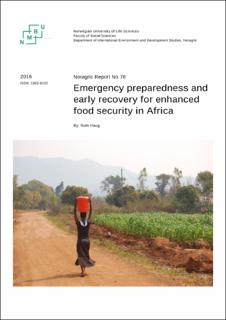| dc.contributor.author | Haug, Ruth | |
| dc.coverage.spatial | Malawi; South Sudan | en_US |
| dc.date.accessioned | 2020-04-08T09:14:31Z | |
| dc.date.available | 2020-04-08T09:14:31Z | |
| dc.date.issued | 2016-10 | |
| dc.identifier.issn | 1892-8102 | |
| dc.identifier.uri | https://hdl.handle.net/11250/2650737 | |
| dc.description.abstract | The purpose of this study is to assess the practical meanings of emergency preparedness and early recovery in relation to improved food security in Africa. Emergency preparedness is addressed at the global level as well as in two different country cases: Malawi and South Sudan. A framework for action is proposed regarding how to succeed with preparedness and early recovery for improved food security in Africa. Norway has an important role to play in the global humanitarian system, not only as a significant funder and supporter of increased efficiency, but also with comparative advantages in certain fields such as peace negotiations, institutional collaboration and capacity development, gender equality, climate change, climate smart agriculture and seed security. Different kinds of tailor-made social protection programs will increasingly make their way into future emergency preparedness efforts for enhanced food security. A low hanging fruit for resilience building could be to assist with social protection to avoid seasonal hunger and thereby reduce vulnerability to possible disasters. | en_US |
| dc.language.iso | eng | en_US |
| dc.publisher | Norwegian University of Life Sciences, Ås | en_US |
| dc.relation.ispartofseries | Noragric report;78 | |
| dc.title | Emergency preparedness and early recovery for enhanced food security in Africa | en_US |
| dc.type | Report | en_US |
| dc.subject.nsi | VDP::Agriculture and fishery disciplines: 900::Agriculture disciplines: 910::Other agricultural disciplines: 919 | en_US |
| dc.source.pagenumber | 41 | en_US |
